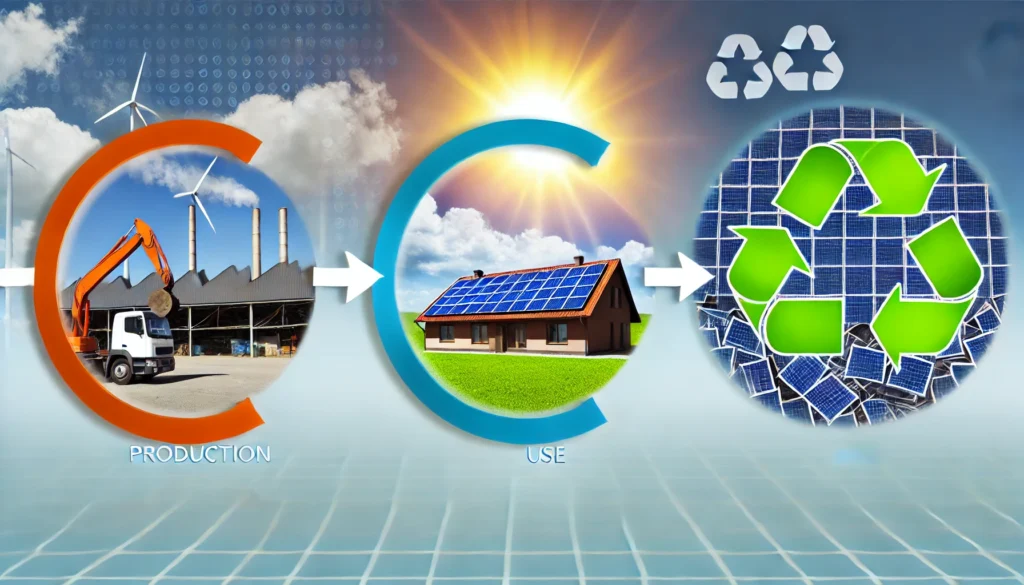The Life Cycle of Solar Panels: Production, Use, and Recycling
Solar panels are a cornerstone of renewable energy, offering a clean alternative to fossil fuels. But what about their environmental impact over their entire life cycle—from production to disposal? Understanding the journey of solar panels from manufacturing to recycling is essential to appreciate their long-term benefits and address concerns about sustainability.
Let’s examine the life cycle of solar panels, highlighting how advances in technology and recycling initiatives are shaping a more sustainable future.
- The Production Phase: Building Solar Panels
Solar panels are primarily made from silicon, glass, and metals like aluminum and silver. The manufacturing process begins with raw materials, but it also raises questions about environmental impact.
- Raw Material Extraction: The creation of solar cells starts with mining silicon, one of the most abundant elements on Earth. However, the extraction and refinement processes require energy, often sourced from non-renewable resources, which contributes to carbon emissions.
- Manufacturing Energy Use: Producing solar panels involves processes like wafer cutting, doping, and assembling cells into panels. These steps can be energy-intensive, but improvements in manufacturing efficiency and the adoption of renewable energy at factories are reducing their carbon footprint.
- Supply Chain Sustainability: The transportation of raw materials and finished panels adds to the environmental impact. Localizing supply chains and improving logistics are helping to minimize emissions.
While the production phase has an environmental cost, studies show that solar panels generate far more clean energy over their lifetime than the energy used to manufacture them.
- The Use Phase: Clean Energy Generation
The longest phase of a solar panel’s life cycle is its use, during which it produces clean, renewable energy for decades.
- Energy Payback Time: Most solar panels offset the energy used in their production within 1–4 years, depending on location and panel type. After this period, the energy they generate is entirely carbon-free.
- Durability and Lifespan: Solar panels typically last 25–30 years, with many still functioning beyond this period at reduced efficiency. This longevity makes solar panels one of the most sustainable energy technologies available.
- Environmental Benefits: During their operational life, solar panels generate electricity without emitting greenhouse gases or pollutants. This helps reduce reliance on fossil fuels and mitigates climate change.
The use phase is where solar panels shine, providing clean energy that far outweighs their environmental costs during production.
- The Recycling Phase: Closing the Loop
As more solar panels reach the end of their life, recycling initiatives are becoming critical to minimize waste and recover valuable materials.
- Recycling Challenges: Solar panels are complex products made from multiple layers of materials, making recycling more difficult than traditional products. However, advancements in recycling technology are improving recovery rates.
- Recoverable Materials: Panels contain valuable materials like silicon, aluminum, and silver, which can be extracted and reused. Recycling these components reduces the need for mining and lowers the environmental impact of producing new panels.
- Global Recycling Efforts: Organizations like the Solar Energy Industries Association (SEIA) and PV Cycle are leading initiatives to establish recycling infrastructure. Some manufacturers are also taking responsibility by creating take-back programs to recycle their products.
Recycling solar panels ensures that they remain a sustainable solution even after their operational life, contributing to a circular economy.
- The Environmental Impact of Solar Panels
While solar panels are a clean energy solution, their environmental impact must be considered holistically.
- Carbon Footprint Comparison: Over their entire life cycle, solar panels have a significantly lower carbon footprint than fossil fuel-based energy sources. Studies show that even with production and recycling emissions, solar panels are far more environmentally friendly.
- Landfill Concerns: Without proper recycling programs, old solar panels could end up in landfills, where some components may leach into the soil. Expanding recycling infrastructure is essential to prevent this.
- Reducing Production Impact: Manufacturers are increasingly using renewable energy in their production processes, reducing emissions and improving the sustainability of solar panels from the start.
By addressing these challenges, the solar industry is working to ensure that panels remain a net-positive solution for the environment.
- Innovations in Sustainable Solar Technology
The solar industry is constantly innovating to minimize the environmental impact of solar panels throughout their life cycle.
- Thin-Film Solar Panels: These panels use fewer raw materials and less energy to produce than traditional silicon panels, making them a more sustainable option.
- Energy-Efficient Manufacturing: Advances in automation and renewable-powered factories are reducing the carbon footprint of panel production.
- Design for Recycling: Manufacturers are exploring ways to design panels that are easier to disassemble and recycle, paving the way for a truly circular solar industry.
These innovations ensure that the next generation of solar panels will be even more environmentally friendly than today’s models.
Conclusion
The life cycle of solar panels demonstrates their long-term environmental benefits, even when accounting for the energy used in production and recycling challenges. From clean energy generation during their use phase to ongoing improvements in recycling, solar panels are an essential tool in the fight against climate change.
As recycling initiatives and sustainable production methods continue to evolve, the solar industry is becoming even greener, reinforcing its role as a key player in a sustainable energy future. By investing in solar energy, you’re not only reducing your carbon footprint today but also supporting a cleaner, more sustainable tomorrow. Ready to make the switch? Contact us to learn more about solar panel installation for your home!
Ready to make the switch?
Contact us today to learn how solar panels can help you save more in the long run!
Complete Residential Solar Panels and Systems. Serving Texas, Oklahoma, Kansas, Missouri, Utah, Florida & Ohio
Get a Free Quote Now
